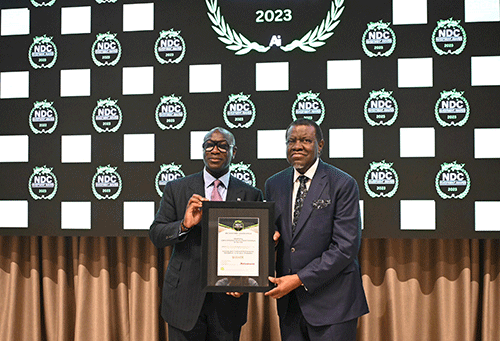President Hage Geingob yesterday received the Green Infrastructure Investment Statesman of the Year award.
Geingob became the second recipient of this award presented by the NDC Investment Awards at the COP28 Africa Investment Earthshot Leaders Summit underway in Dubai, UAE.
The Nationally Determined Contributions (NDC) Investment awards recognise institutions and individuals who are working to innovate and break new ground to mobilise private capital and private sector participation at scale in bankable NDC investment commitments and projects.
“I am honoured to join you this afternoon as one of the recipients of the NDC Investment Awards. I would like to express our appreciation to the Africa Invest Group for having nominated me to receive tonight’s award on behalf of Namibia,” said Geingob after receiving the award.
The Head of State said in the context of industrialising nations, NDCs provide a structured framework to align climate action with sustainable development goals.
“By integrating climate mitigation and adaptation measures into their industrialisation plans, Namibia plans to foster green growth, ensuring that economic development occurs in an environmentally responsible manner,” he noted.
NDCs play a pivotal role in the global endeavour to combat climate change, especially for industrialising nations.
Geingob said these commitments serve as a roadmap for countries to outline their specific plans, strategies, and targets for mitigating greenhouse gas emissions and adapting to the impacts of climate change.
He added: “For Namibia, NDCs also act as a catalyst for attracting international support and financing. The estimated cost for implementing Namibia’s NDCs is US$15 billion by 2030, with 90% of it contingent on financial support from the Multilateral Funding Windows under the United Nations Framework Convention on Climate Change. We take note of all the progress that have been made at this 28th Conference of Parties to mobilise the necessary resources from our more developed peers. We need to do more.”
Geingob indicated that the impact on Namibia’s population, heavily reliant on climate-sensitive sectors such as agriculture, livestock farming, and fishing, is having a profound impact on citizens exacerbating poverty, unemployment, and existing income inequalities.
“Climate change is disrupting our way of life, negatively impacting our ability to achieve the Sustainable Development Goals. The Intergovernmental Panel on Climate Change’s sixth report identifies Namibia as one of the most vulnerable nations in Sub-Saharan Africa, with rising temperatures, increased evaporation, and rainfall variability posing significant challenges.”
He noted that Namibia, with its vast landscapes and untapped renewable potential, aspires to lead the charge in green industrialisation across the African continent by harnessing the power of renewable energy.
Geingob also participated in the Summit of G-77 and China Leaders on Climate Change and attended an initial meeting of the Critical Raw Materials Club that was organised by the European Commission.
– psiririka@nepc.com.na


